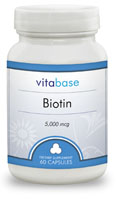| Biotin deficiency results in fatigue, depression, nausea, muscle pains, hair loss, and anemia. Biotin is necessary for both metabolism and growth in humans, particularly with reference to production of fatty acids, antibodies, digestive enzymes, and in niacin (vitamin B3) metabolism. Biotin is required in a number of enzymatic reactions in the body, particularly in the production of energy from carbohydrates and fats. Biotin is also required in the manufacture of fats and in the excretion of protein by-products.
Biotin is necessary for both metabolism and growth in humans, particularly with reference to production of fatty acids, antibodies, digestive enzymes, and in niacin (vitamin B3) metabolism.
Biotin deficiencies are not frequently found in humans. The small amount of biotin required is usually supplied by the diet and by microorganisms in the gastrointestinal tract. Biotin deficiency can be induced in humans by feeding them raw egg whites, which contain a protein that binds biotin and prevents its absorption. Long-term antibiotic use can interfere with biotin production in the intestine and increase the risk of deficiency symptoms, such as dermatitis, depression, hair loss, anemia, and nausea. Long-term use of anti-seizure medications may also lead to biotin deficiency.
Alcoholics, people with inflammatory bowel disease, and those with diseases of the stomach have been reported to show evidence of poor biotin status. Diabetics may have a deficiency of certain enzymes in the body (biotin-dependant enzymes), which may lead to a biotin deficiency and possible problems in the nervous system. A number of drugs deplete biotin levels, such as antibiotics (tetracycline, sulfonamides, trimethoprim, penicillin, macrolides, fluoroquinolones and cephalosporins) and sedative and anti-epileptic drugs (phenytoin, barbiturates, carbamazepine, phenobarbitol and primidone). People with type 2 diabetes often have low levels of biotin. Biotin may be involved in the synthesis and release of insulin. Preliminary studies in both animals and people suggest that biotin may help improve blood sugar control in those with diabetes, particularly type 2 diabetes. More research in this area would be helpful.
Symptoms of a biotin deficiency include hair loss, a dry, scaly rash around the eyes, nose, mouth, and genital area, decreased appetite, nausea and vomiting and failure to thrive in children. Neurologic symptoms in adults have included depression, lethargy, hallucination, and numbness and tingling of the extremities. Individuals with hereditary disorders of biotin metabolism resulting in functional biotin deficiency have evidence of impaired immune system function, including increased susceptibility to bacterial and fungal infections. Infants deficient in biotin often develop this scaly scalp condition. Some infants may respond to biotin supplementation either through formulas or breast milk. | 